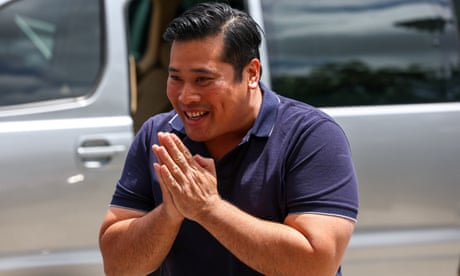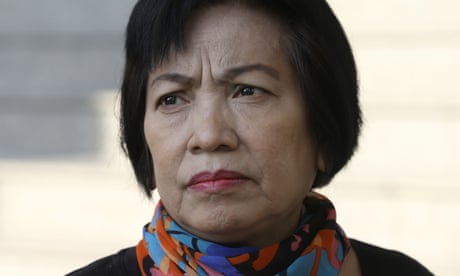ABOLISH LESE MAJESTE
Estranged son of Thai King Vajiralongkorn says discussion of the monarchy should be allowedNew York-based Vacharaesorn Vivacharawongse signals he rejects Thailand’s harsh lese majeste laws, which ban criticism of the royal family
Ron Lopez in Manila, and agencies
Thu 21 Sep 2023

An estranged son of Thailand’s king who has spent almost all his adult life away from his homeland has unexpectedly gone public with his belief that open discussions about the country’s monarchy should be allowed, in a rejection of a harsh royal anti-defamation law.
Vacharaesorn Vivacharawongse, one of the king’s five sons, posted his opinion on Facebook after attending a photo exhibition in New York about people who have been charged under the law, Article 112 of Thailand’s Criminal Code.
The so-called lese majeste law makes insulting the monarch, his immediate family and the regent punishable by up to 15 years in prison per offence.

Thailand king’s estranged son makes surprise return after 27 years
“I love and cherish the monarchy, but I believe it is better to know than not knowing. Every person has their own opinion based on their own experiences. Not listening to them doesn’t make their viewpoints or opinions disappear,” wrote Vacharaesorn, who works at a law firm in New York. “It’s another story whether you agree or disagree with them. Talk to each other with reason.”
Thailand has one of the harshest lese majeste laws in the world, under which people, including children, can be charged for posting, sharing, or liking social media posts that are deemed offensive to the monarchy. In 2015, a man was arrested under the law for posting a satirical online remark about Tongdaeng, a street dog rescued by the late King Bhumibol Adulyadej.
The law is highly controversial, not only because of its tough penalties but also because anyone, not just the royal family, can file complaints about alleged violations with police. Critics say it is often used to quash political dissent and point to many arrests of pro-democracy protesters by the government of former prime minister Prayuth Chan-ocha, who led a military coup in 2014 and remained the country’s leader until last month.
Supporters of the law say the monarchy is the bedrock of Thai identity and should be untouchable.
Vacharaesorn is one of four sons that King Maha Vajiralongkorn had with his second wife, Sujarinee Vivacharawongse, a former actor. In 1996 the then-crown prince divorced Sujarinee, who moved abroad with her children. Their youngest daughter was taken back by the royal family and given the title Princess Sirivannavari Nariratana, but the four sons remain estranged and do not have any formal royal titles.
King Vajiralongkorn has married four times and has seven children, but has not named an official heir.

Woman jailed for record 43 years for insulting Thai monarchy
Vacharaesorn, 42, who had long been out of the public eye, drew major attention in August when he made a brief surprise return to Thailand, where he visited a charity organisation and several Buddhist temples to participate in prayers and offerings. Before departing, he told reporters that he wished Thailand would be “a country full of hope” and that Thai people would “respect one another, listen to one another, no matter who we are.”
His statement about the anti-defamation law was posted after photos circulated online of him attending the exhibition, named Faces Of Victims Of 112, at Columbia University on Monday.
At least 257 people have been charged with lese majeste in 278 cases since November 2020, including at least 20 minors, according to the group Thai Lawyers for Human Rights. Prayuth’s government launched the crackdown as it faced street protests by student-led groups seeking greater democracy, including reforms of the monarchy.
International human rights organizations and UN experts have called on Thailand to repeal the law, which they say is being used to stifle free speech.
Thousands of pro-democracy activists have staged protests against the law in recent years, with 253 protesters charged under the law, including 20 children under 18, according to the Thai Lawyers for Human Rights.
Associated Press contributed to this report
No comments:
Post a Comment